When it comes to majestic and powerful predators, few animals can rival the size and presence of the largest cat species. These big cats are not only awe-inspiring due to their sheer size but also because of their unique adaptations to various habitats around the world. In this article, we explore the top 10 largest cat species, highlighting their impressive physical attributes, unique features, and the environments they inhabit.
Top 10 Largest Cat Species:
1. Siberian Tiger (Panthera tigris altaica)
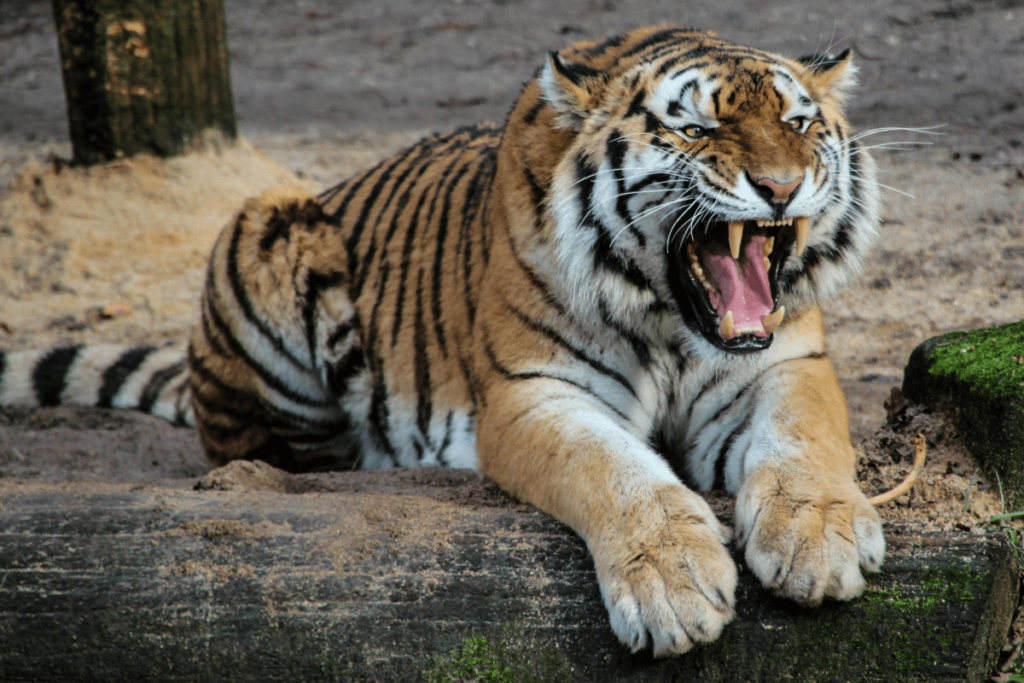
The Siberian Tiger, also known as the Amur Tiger, is the largest of all tiger subspecies, Biggest Cat in the World. Native to the forests of Siberia and northeastern China, this magnificent feline is renowned for its thick fur, which helps it endure the harsh winters of its habitat. Siberian Tigers are solitary animals, marked by their powerful build and impressive strength.
| Common Name | Siberian Tiger |
| Scientific Name | Panthera tigris altaica |
| Family Name | Felidae |
| Type | Big Cat |
| Height | 3.3 feet (1 meter) |
| Length | 12.1 feet (3.7 meters) |
| Tail Length | 3.3 feet (1 meter) |
| Weight | 660-800 pounds (300-365 kg) |
| Size Relative to a 6-Ft Human | 2.2 to 2.7 times larger |
| Group Name | A streak or ambush |
| Habitat | Forests of Siberia and northeastern China |
Unique Features: The Siberian Tiger is distinguished by its thick, dense fur, which provides insulation against the cold. It has a robust body structure with a large head and powerful legs, allowing it to hunt large prey and cover vast territories
2. Bengal Tiger (Panthera tigris tigris)
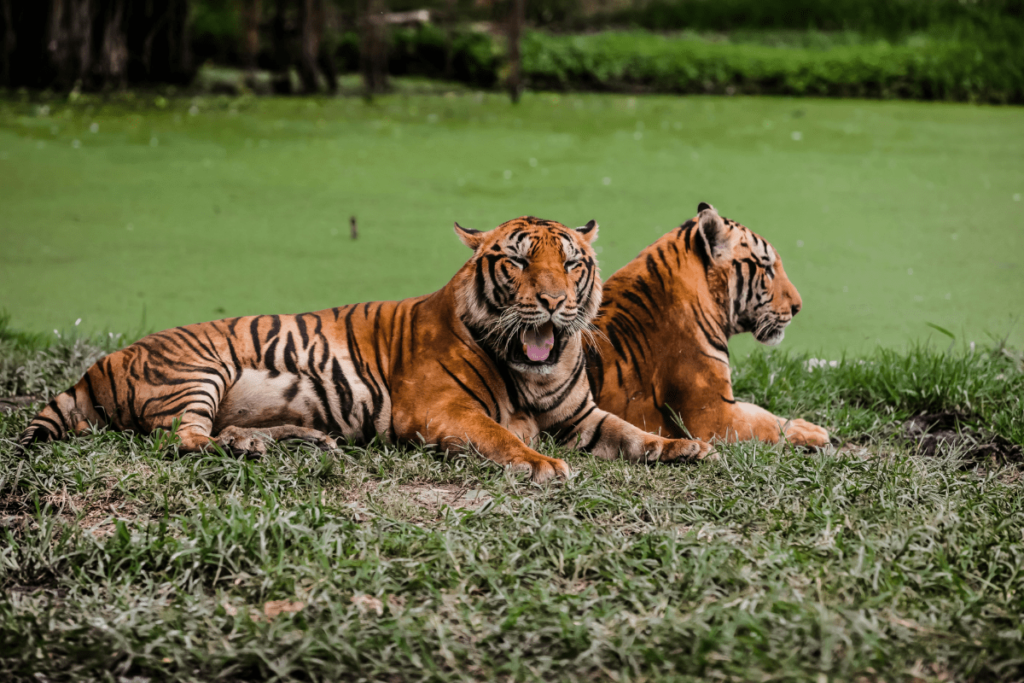
Among the biggest cats in the world, the Bengal tiger is renowned for its fierce strength and large size. The Bengal Tiger, the most numerous of all tiger subspecies, roams the grasslands and tropical forests of India, Bangladesh, and parts of Southeast Asia. This tiger is easily recognized by its striking orange coat with black stripes.
Talking about fierce, also check out Why Wolverine (Animal) is called The Fiercest Predator in the Animal Kingdom.
| Common Name | Bengal Tiger |
| Scientific Name | Panthera tigris tigris |
| Family Name | Felidae |
| Type | Big Cat |
| Height | 3 feet (0.9 meters) |
| Length | 10.1 feet (3.1 meters) |
| Tail Length | 3.3 feet (1 meter) |
| Weight | 400-600 pounds (180-270 kg) |
| Size Relative to a 6-Ft Human | 1.6 to 2 times larger |
| Group Name | A streak or ambush |
| Habitat | India, Bangladesh, and parts of Southeast Asia |
Unique Features: Bengal Tigers are known for their striking appearance with bright orange fur and bold black stripes. They are highly adaptable and can thrive in various habitats, from tropical forests to grasslands.
3. African Lion (Panthera leo)
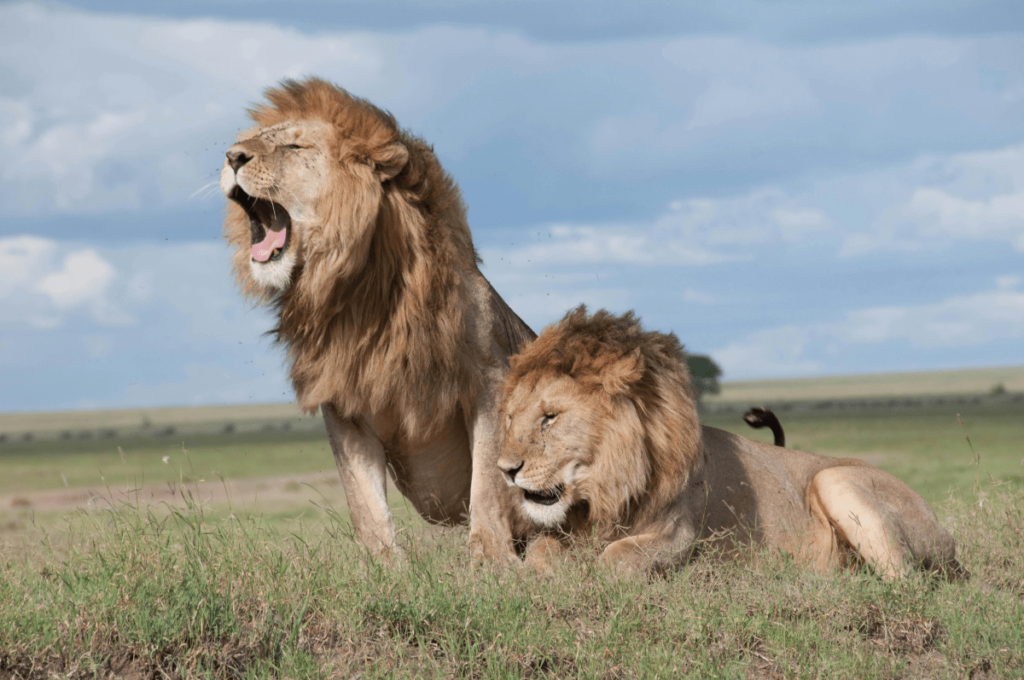
The African Lion is an iconic species found across sub-Saharan Africa. It is one of the Biggest Cats in the World. Unlike most big cats, lions are highly social animals, living in groups known as prides. They are recognized by their impressive manes, especially in males.
| Common Name | African Lion |
| Scientific Name | Panthera leo |
| Family Name | Felidae |
| Type | Big Cat |
| Height | 3.5 feet (1.1 meters) |
| Length | 10.5 feet (3.2 meters) |
| Tail Length | 3 feet (0.9 meters) |
| Weight | 300-500 pounds (140-230 kg) |
| Size Relative to a 6-Ft Human | 1.7 to 2.5 times larger |
| Group Name | A pride |
| Habitat | Sub-Saharan Africa |
Unique Features: The African Lion is distinguished by its social structure and its majestic mane, which is unique to males. The mane not only serves as a visual display but also provides protection during fights.
4. Jaguar (Panthera onca)
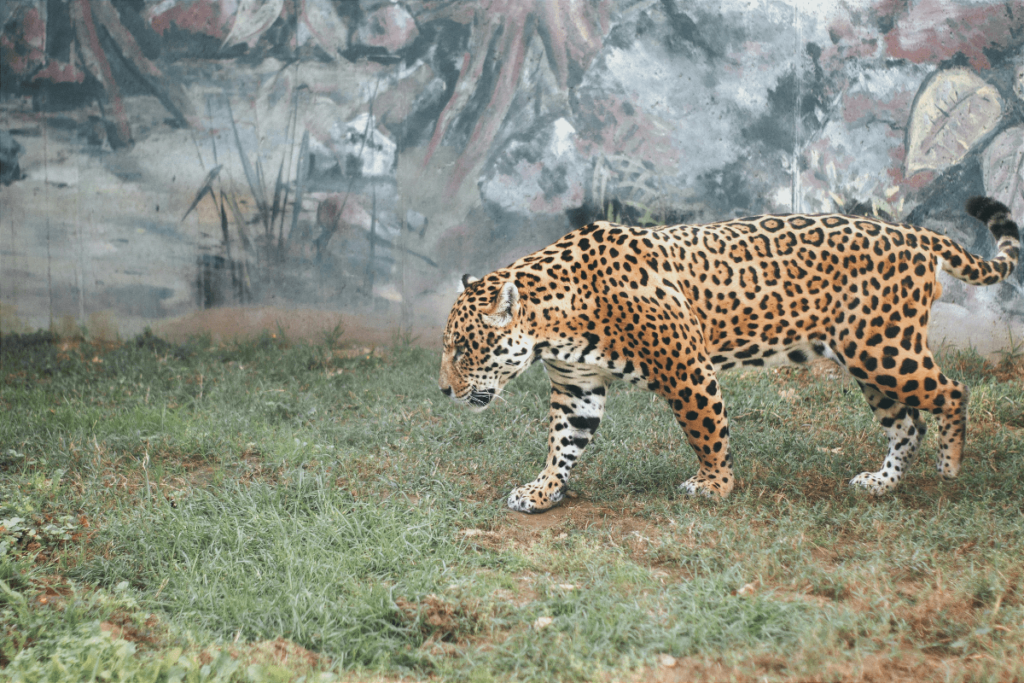
When discussing the largest cat species, the jaguar is notable for its muscular body. The Jaguar, native to Central and South America, is known for its powerful bite and robust build. Jaguars are adept hunters and are particularly noted for their ability to crush the shells of turtles and the skulls of other prey.
| Common Name | Jaguar |
| Scientific Name | Panthera onca |
| Family Name | Felidae |
| Type | Big Cat |
| Height | 2.5 feet (0.8 meters) |
| Length | 9.5 feet (2.9 meters) |
| Tail Length | 3 feet (0.9 meters) |
| Weight | 200-300 pounds (90-136 kg) |
| Size Relative to a 6-Ft Human | 1.5 to 2 times larger |
| Group Name | A shadow or a leap |
| Habitat | Central and South America |
Unique Features: Jaguars have incredibly powerful jaws and a unique pattern of rosettes on their fur. They are also known for their ability to swim and hunt in water.
5. Snow Leopard (Panthera uncia)
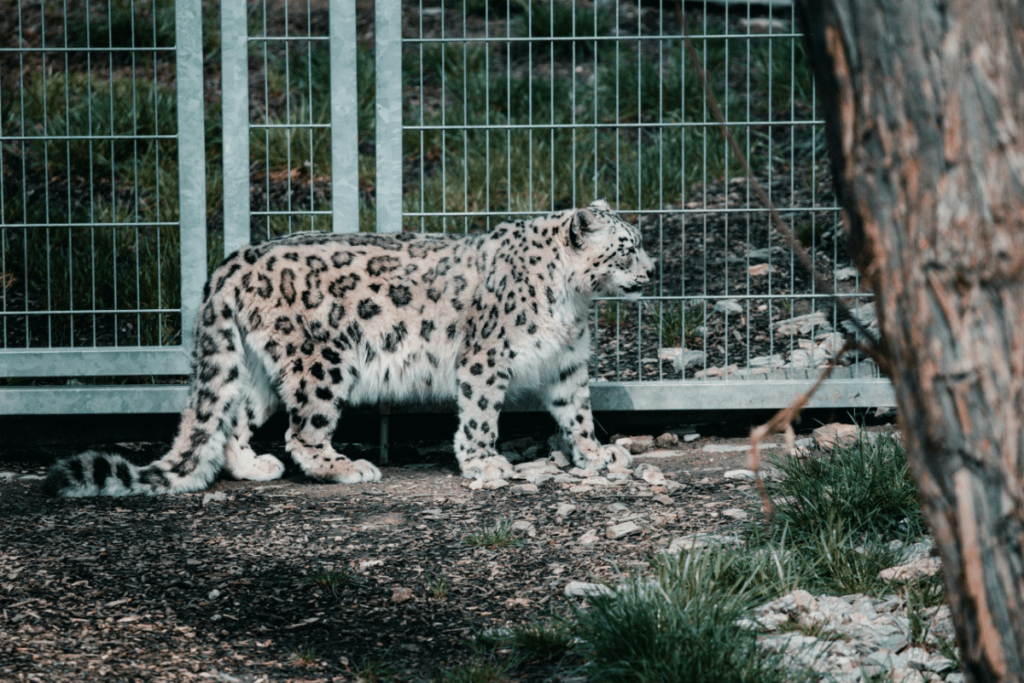
The Snow Leopard, adapted to the rugged mountain ranges of Central and South Asia, is renowned for its long, thick fur and its ability to navigate steep, rocky terrains. It is a solitary and elusive big cat. Among the largest cats in the world, the Snow Leopard is prominent for its strength and considerable size.
| Common Name | Snow Leopard |
| Scientific Name | Panthera uncia |
| Family Name | Felidae |
| Type | Big Cat |
| Height | 2.5 feet (0.8 meters) |
| Length | 7.9 feet (2.4 meters) |
| Tail Length | 3.3 feet (1 meter) |
| Weight | 60-120 pounds (27-55 kg) |
| Size Relative to a 6-Ft Human | 1.3 to 1.8 times larger |
| Group Name | A leap or a slink |
| Habitat | Mountain ranges of Central and South Asia |
Unique Features: Snow Leopards are known for their thick, spotted fur and long tail, which aids in balance as they traverse their steep mountainous habitat.
6. Cougar (Puma concolor)
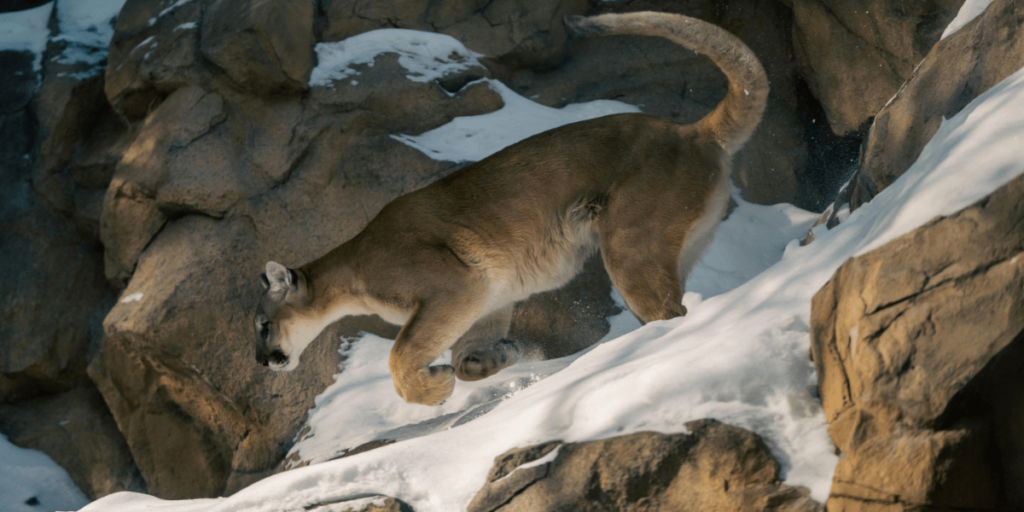
The Cougar, also known as the Mountain Lion or Puma, is a highly adaptable big cat found across North and South America. It is the largest wild cat in the Americas and has a varied diet and wide distribution.
| Common Name | Cougar |
| Scientific Name | Puma concolor |
| Family Name | Felidae |
| Type | Big Cat |
| Height | 2.5 feet (0.8 meters) |
| Length | 8.4 feet (2.6 meters) |
| Tail Length | 2.6 feet (0.8 meters) |
| Weight | 64-220 pounds (29-100 kg) |
| Size Relative to a 6-Ft Human | 1.1 to 2 times larger |
| Group Name | A pounce or a leap |
| Habitat | North and South America |
Unique Features: Cougars are highly adaptable and can thrive in a variety of habitats. They are solitary hunters and have a diverse diet, including deer, small mammals, and even domestic animals.
7. Lynx (Lynx lynx)
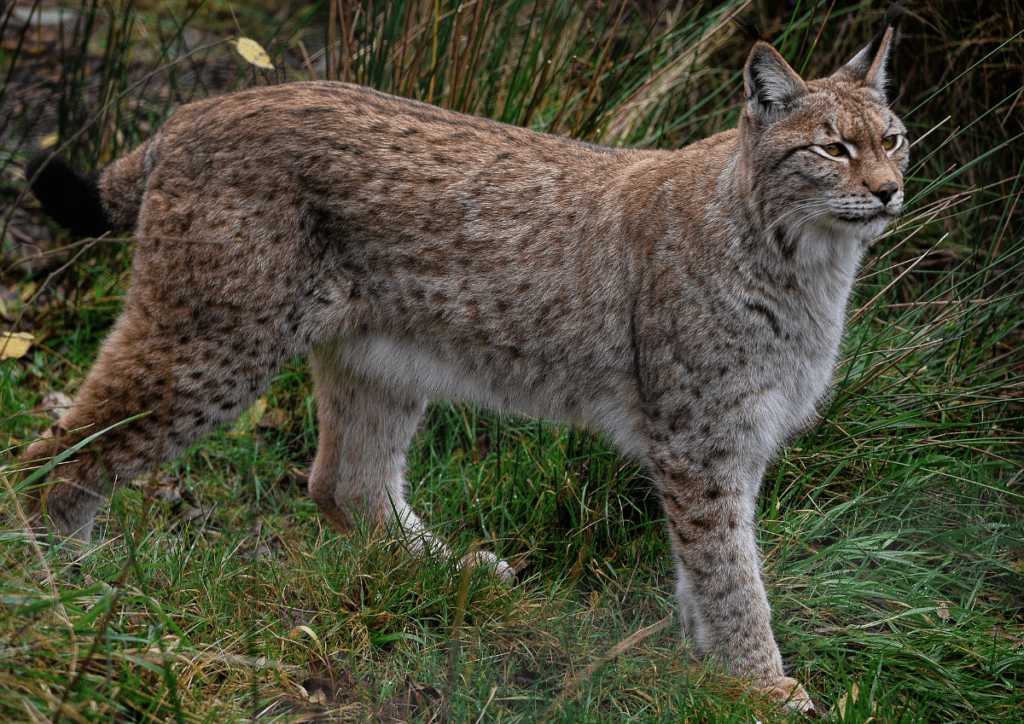
The Eurasian Lynx, native to the forests and tundra of Europe and Asia, is known for its distinctive tufted ears and short tail. It is a medium-sized big cat with excellent hunting skills and agility. The Lynx is also considered one of the largest cats in the world, though it is smaller compared to the Siberian tiger.
| Common Name | Lynx |
| Scientific Name | Lynx lynx |
| Family Name | Felidae |
| Type | Medium Cat |
| Height | 2 feet (0.6 meters) |
| Length | 6.6 feet (2 meters) |
| Tail Length | 1 foot (0.3 meters) |
| Weight | 40-66 pounds (18-30 kg) |
| Size Relative to a 6-Ft Human | 1.1 to 1.5 times larger |
| Group Name | A clowder or a leap |
| Habitat | Forests and tundra of Europe and Asia |
Unique Features: Lynxes are known for their tufted ears, short tail, and large paws, which help them walk on snow. They are solitary hunters and have excellent camouflage in their snowy habitats.
8. Cheetah (Acinonyx jubatus)
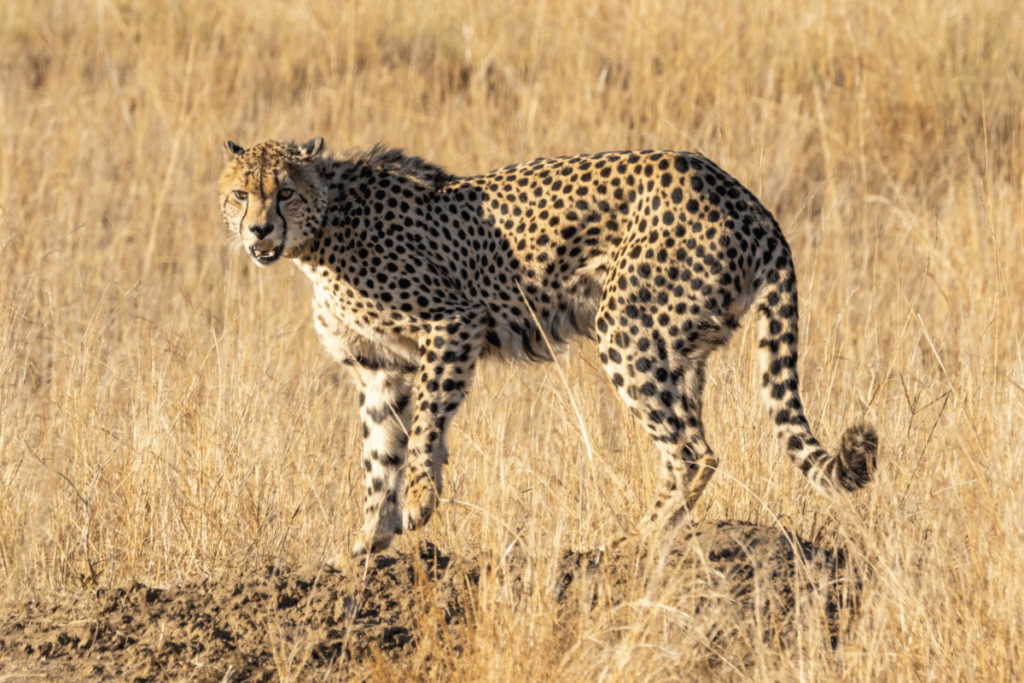
The Cheetah, renowned for its incredible speed, is native to the grasslands of Africa. Unlike other big cats, the Cheetah is built for speed with its sleek, aerodynamic body.
| Common Name | Cheetah |
| Scientific Name | Acinonyx jubatus |
| Family Name | Felidae |
| Type | Big Cat |
| Height | 2.5 feet (0.8 meters) |
| Length | 7.5 feet (2.3 meters) |
| Tail Length | 2.5 feet (0.8 meters) |
| Weight | 77-143 pounds (35-65 kg) |
| Size Relative to a 6-Ft Human | 1.1 to 1.5 times larger |
| Group Name | A leap |
| Habitat | Grasslands of Africa |
Unique Features: The Cheetah is the fastest land animal, capable of reaching speeds up to 60-70 miles per hour (97-113 km/h). It has a lightweight body and specialized adaptations for high-speed chases.
9. Clouded Leopard (Neofelis nebulosa)
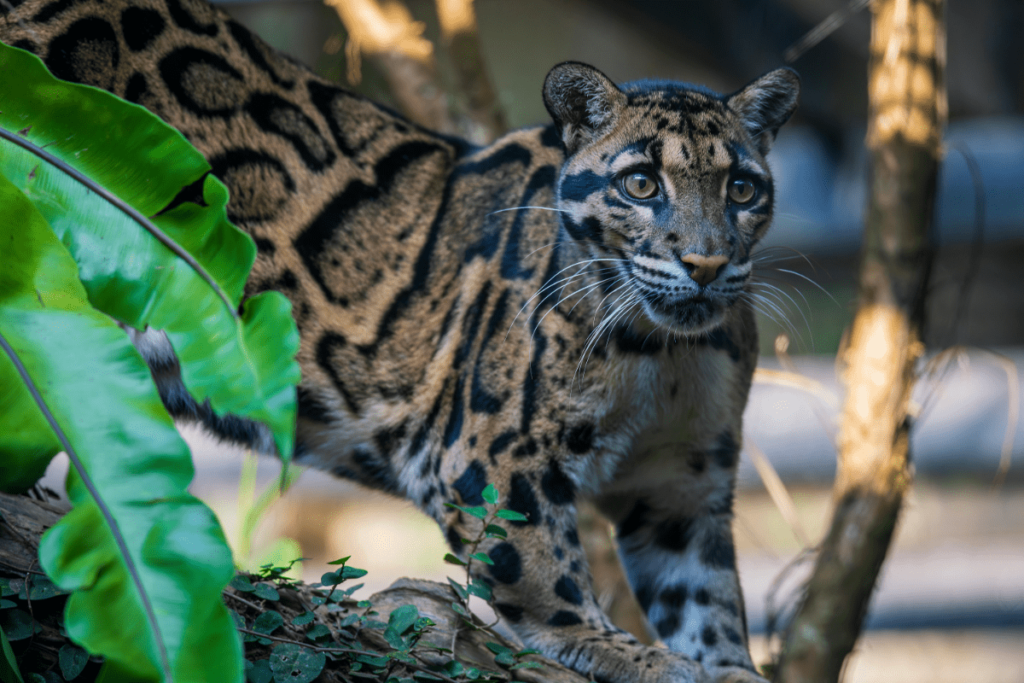
The Clouded Leopard, found in the forests of Southeast Asia, is known for its distinctive cloud-like spots and arboreal lifestyle. It is a smaller big cat with a unique appearance and climbing ability.
| Common Name | Clouded Leopard |
| Scientific Name | Neofelis nebulosa |
| Family Name | Felidae |
| Type | Medium Cat |
| Height | 2 feet (0.6 meters) |
| Length | 6.1 feet (1.9 meters) |
| Tail Length | 3 feet (0.9 meters) |
| Weight | 24-50 pounds (11-23 kg) |
| Size Relative to a 6-Ft Human | 0.7 to 1.1 times larger |
| Group Name | A leap or a shadow |
| Habitat | Forests of Southeast Asia |
Unique Features: The Clouded Leopard has a unique coat pattern with large, irregular spots and cloud-like markings. Its strong limbs and long tail make it an excellent climber, adapted to life in the trees.
10. Caracal (Caracal caracal)
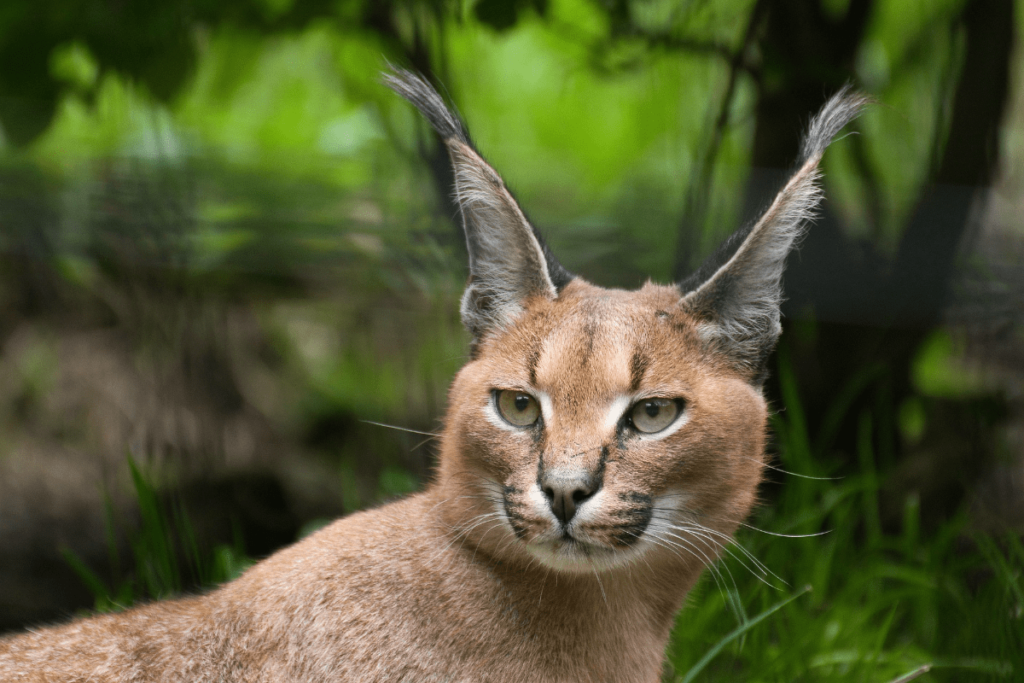
The Caracal is a medium-sized wild cat known for its distinctive tufted ears and impressive leaping ability. It is found across Africa, the Middle East, Central Asia, and parts of India. Renowned for its agility and stealth, the Caracal is a skilled hunter of small to medium-sized prey.
| Common Name | Caracal |
| Scientific Name | Caracal caracal |
| Family Name | Felidae |
| Type | Medium-sized Cat |
| Height | 16-20 inches (40-50 cm) |
| Length | 24-42 inches (60-105 cm) |
| Tail Length | 8-10 inches (20-25 cm) |
| Weight | 15-42 pounds (7-19 kg) |
| Size Relative to a 6-Ft Human | 0.5 to 0.75 times larger |
| Group Name | A clowder or a pounce |
| Habitat | Africa, Middle East, Central Asia, parts of India |
Unique Features: Caracals have distinctive tufted ears and powerful legs for leaping. They are known for their agility and ability to hunt a wide range of prey, including birds and small mammals.
Conclusion:
Why didnt we Include Liger, Black Panther, and King Cheetah in this list?
These variations were not included in the original list of the largest cat species because they are not distinct species. Hybrids like ligers and tigons are the result of human intervention in captivity rather than natural occurrences. Color morphs such as the golden tabby tiger, king cheetah, and black panther are genetic mutations within existing species, not separate species themselves. Additionally, some variations, like the blue tiger, are based on anecdotal reports and have not been scientifically verified. Therefore, the focus remains on ranking the largest species based on size and weight, rather than including these unique but specific genetic variations.
Are Siberian tiger and Bengal tiger different Species:
The Siberian tiger and Bengal tiger are included separately in the list because they are distinct subspecies of the tiger, each with unique physical and genetic characteristics that have evolved due to their geographic isolation and environmental pressures. The Siberian tiger, found primarily in the Russian Far East, is the largest tiger subspecies, adapted to cold climates with a thicker fur and paler coat, while the Bengal tiger, native to the Indian subcontinent, has a more vibrant orange coat with dense black stripes, suited to its diverse and warmer habitats. These subspecies are not just color variations but represent naturally occurring, geographically distinct populations with different behaviors, habitats, and conservation statuses.
We have a comprehensive comparison in a detailed article. Check it out here: Siberian Tiger vs. Bengal Tiger.
Final Verdict:
These largest cat species embody the incredible diversity and adaptability of the Felidae family. From the imposing Siberian Tiger to the agile Caracal, each species showcases unique characteristics and adaptations that make them fascinating and formidable predators. Among all felines, the Siberian tiger is recognized as the biggest cat in the world due to its sheer bulk and length. Understanding these magnificent creatures helps us appreciate the delicate balance of their ecosystems and the importance of conservation efforts to protect these majestic animals. If you found this exploration of the biggest cats in the world intriguing, feel free to share your thoughts and engage with us by commenting below!
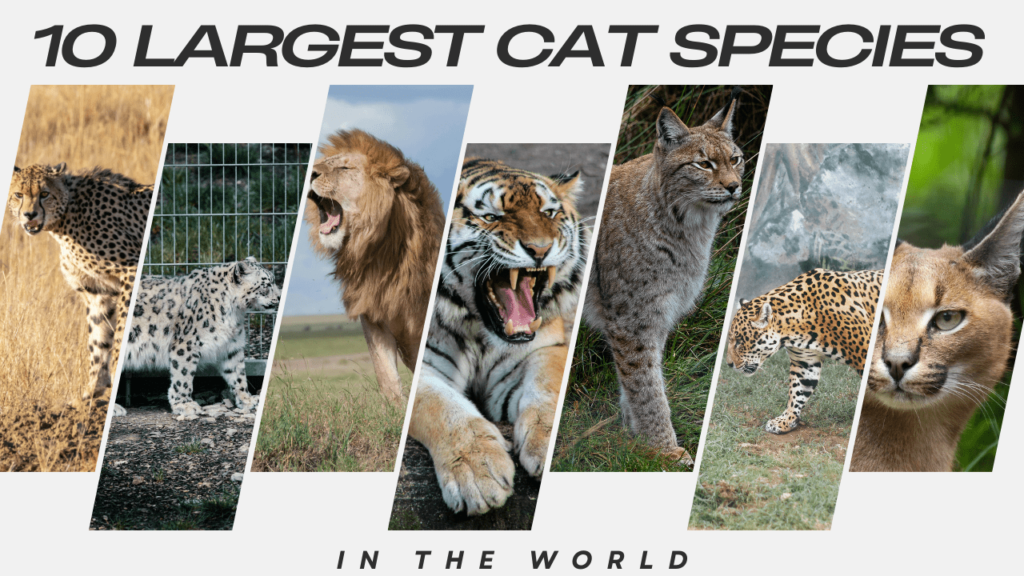




Pingback: Siberian Tiger vs Bengal Tiger: A Comprehensive Guide to Their Differences - primalwildlife.com